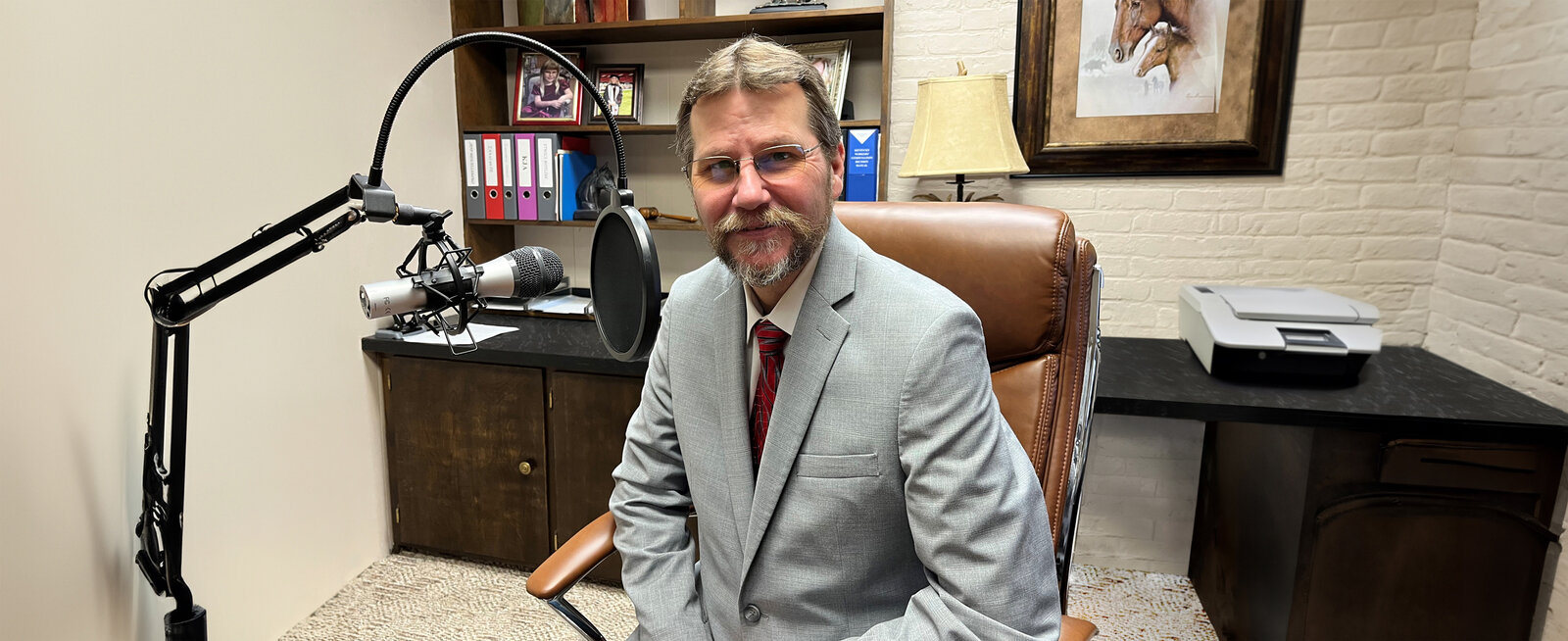Episode 21: Calloway County attorney Jeff Roberts has been practicing for 27 years. He’s going to provide his perspective and advice for anyone considering law school and becoming an attorney. Jeff’s daughter Clarissa, recently graduated from law school, so Jeff’s been able to develop an even newer perspective on the decision.
Law school will definitely teach you how to be a workaholic. In Jeff’s opinion, the successful attorneys typically work substantially longer than a normal work week. In fact, practicing law is significantly different than what Jeff thought it would be in law school. Law school teaches you the basic concepts of law. However, it doesn’t teach you how to actually practice law.
Key activities such as drafting motions, taking witness depositions and other day-to-day activities aren’t really taught in many law schools. Students may have the opportunity to gain exposure to these while clerking or working in law firms, prior to graduation. A strong, experienced mentor is a valuable asset for any new attorney.
The Law School Journey
Interestingly, your undergraduate degree does not have to be a pre-law curriculum. It could be political science, history, economics, business or any number of areas.
To begin, you have to take the Law School Admissions Test (LSAT). Assuming you perform well on this exam, you’ll apply to one or more law schools. Once accepted, it usually takes 3 years to complete law school. You’ll have earned a Juris Doctorate (JD). Once this happens, you’ll prepare to take the Bar exam. This extensive test is required for you to actively practice law in a particular jurisdiction (i.e. in Kentucky, Tennessee, etc.). There is a Uniform Bar Exam, which is generally accepted by multiple states. However, you would still have to take the state-specific portion of the Bar exam to be admitted to practice in a specific jurisdiction.
Things I Wish I’d Known
For Jeff, this biggest surprise is that after completing law school, he’d still need to learn the day-to-day art of actually practicing law. Luckily, Jeff did have a mentor who was able to provide constructive criticism as he learned by doing.
Another difficult issue is understanding the need to be able to have difficult conversations with clients and their families, as you attempt to help them through challenging situations. When Jeff first started practicing injury law, he found it difficult to sometimes reassure clients and to manage the expectations of his clients. These are challenging conversations for many new attorneys, especially when the client has sustained a life-changing injury.
These days, Jeff actively encourages his clients to ask questions so he can be sure there is a proper understanding of the situation. It also helps him to make sure he understands the issue(s) the client is concerned about. This helps to avoid confusion, while again, also helping to set the correct expectations.
Are You Prepared for the Stress?
The stress of practicing law can be a significant factor. The pressure of law school can help the individual to begin managing higher stress levels. The law school experience also begins to help the person to acclimate to a heavy workload. Effectively managing deadlines is a critical skill for anyone who wants to be a successful attorney.
What’s a Typical Day Like for Jeff Roberts?
To frame this answer, Jeff is a solo-practitioner who handles personal injury, workers’ compensation and social security disability claims. He’s the only attorney in his office, but he has staff to assist him. His experience will be different from someone who works at a larger firm or focuses on another area of law.
Each day varies for Jeff. This can keep it exciting. In addition to his private practice, Jeff is also an Assistant County Attorney handling child abuse and child neglect cases in Family Court. He’s usually in court on Mondays working with these cases until noon or later. The abuse and neglect cases require work throughout the week, but Mondays are when the hearings typically occur.
Jeff may also have hearings related to his injury cases throughout the week. Some of the hearings are done remotely, via online Zoom video meetings. He’ll meet with clients most days, depending upon what is going on and the status of the cases he’s handling. He’ll spend time drafting documents, editing and correcting documents, taking depositions, etc. There’s really no typical day.
Related to the heavy workload, we recently discussed that Jeff had an oral argument before the KY Supreme Court, on behalf of his client. He came in during the weekend to prepare for hearing.
It’s not unusual for Jeff to work afterhours and/or on the weekends to get briefs and other legal documents drafted or simply to catch up on the activities that mount up during the week. Again, it’s critical that deadlines be met to avoid causing problems from a legal and/or procedural standpoint.
Jeff handles cases across Kentucky, so this adds the possibility of travel time, arranging schedules on different time zones and logging some serious windshield time. He can make phone calls while driving, but many of the other activities will have to wait. Video conferencing is making this easier, but there’s still a fair bit of travel.
You may find the amount of technology used in practicing law to be a surprise. You need to learn to become comfortable with a tremendous amount of technology and online resources. Legal research is nearly exclusively done online, now. Extensive client files and records are often uploaded to a server or other cloud-based system.
Jeff Closes with 3 Important Pieces of Advice
First, if you’re planning on going to law school to become an attorney based on what you’ve seen on TV, you’re going to quickly find out that it’s nothing like what you see on Law and Order or other shows.
The second important piece of advice is to always remember the Golden Rule. Treat your clients like you would want to be treated. Give them the respect you would want someone else to give your mother or father.
The third piece of advice is something another attorney shared with him, years ago. It’s that if you’re not careful, you will lose your reputation one time and you will never get it back. The point is handle the situation the way you should, because your colleagues, judges and others are always watching. Ethics and integrity are vital.
For more information, visit www.JeffRobertsLaw.com. This podcast is meant to provide information and is not legal advice. Jeff’s principal office is located at 509 Main Street, Murray, Kentucky. Co-host Jim Ray is a non-attorney spokesperson. This is an advertisement.





